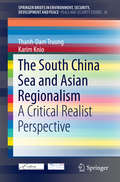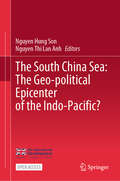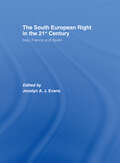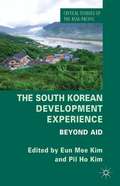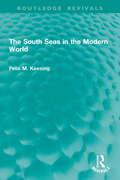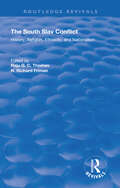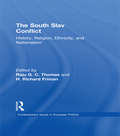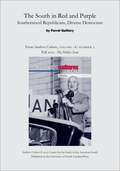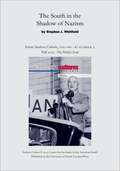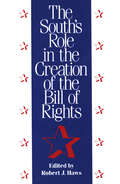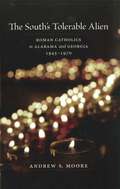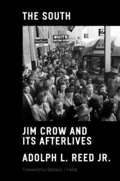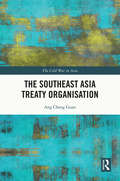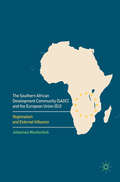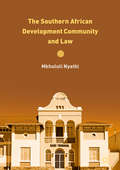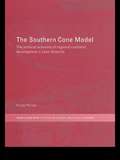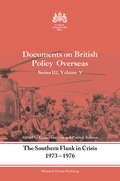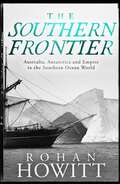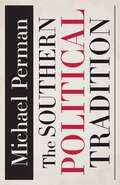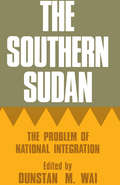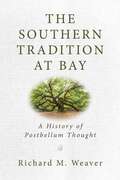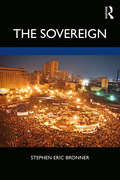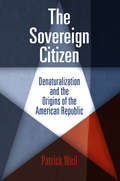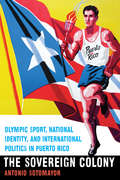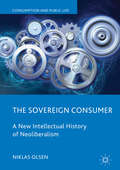- Table View
- List View
The South China Sea and Asian Regionalism
by Thanh-Dam Truong Karim KnioThis book offers an innovative approach to the analysis of the current crisis in the South China Sea. Moving beyond the spirit of the UN Convention on the Law of the Sea (UNCLOS), the mechanisms of which are limited to physical geography, it demonstrates how epistemological insights from the field of critical realist philosophy can reveal the importance of cultural and structural conditioning processes in social interactions, processes which shape the conditions for the emergence of crisis points along a spectrum of conflict and cooperation. The potential for conflict resolution and the emergence of new regions in Pacific Asia much depends on the nature of such interactions at many levels (political-economic, semiotic and cultural) based on perceptions of what constitutes the "common" versus a Sinicised version of "Lebensraum".
The South China Sea: The Geo-political Epicenter of the Indo-Pacific?
by Nguyen Hung Son Nguyen Thi Lan AnhThis open access book focuses on the geopolitical competition in the South China Sea, an area with highly concentrated choke points in the Indo-Pacific, presenting ideas and recommendations to manage this competition and foster cooperation to maintain a peaceful and stable environment and promote sustainable governance of the South China Sea and of the Indo-Pacific in a broader sense. The increasingly complex geopolitics of the Indo-Pacific has made the South China Sea the epicenter of strategic competition between the great powers, with a rising China on the one hand and the United States, its allies, and partners on the other. In this strategic chessboard, the South China Sea is a test of resilience of the rules-based international order, such as versus grey zone operations, as well as disruptive technological developments in both traditional and non-traditional domains. The book incorporates foreign policy analysis methods to analyze and forecast key players' goals, intentions, and behaviors within the competitive strategic environment of the South China Sea. The success or failure of managing major power competition in the South China Sea, one of the hot spots of the Indo-Pacific region, will determine the future structure of international relations. In addition, as a dynamically developing region of the world, promoting collaborative ideas, particularly in areas related to conflict management is essential for maintaining a peaceful and stable environment, restoring economic growth, and progressing toward a sustainable future. This book is of interest to politicians, policy-makers, experts, scholars, researchers, and other readers who are interested in how regional issues can shape the global order.
The South European Right in the 21st Century: Italy, France and Spain (South European Society and Politics)
by Jocelyn A. J. EvansSince the European-wide domination of social democratic governments during the mid- to late-1990s, Right-wing parties have returned to power in the three largest Mediterranean democracies – Italy, France and Spain. This alternation has been symptomatic of growing majoritarianism in Southern Europe, a trend which has gone against much of the rest of the continent, and of a decline in clientelist effectiveness also traditionally seen as the Southern ‘norm’. This volume assesses the subsequent periods of incumbency of these three governments, considering the salient features of each in their reaction to winning government and implementing policy, given their divergent historical roots and paths to power. In particular, it focuses on the evolving role of perceived extremist elements on the Right, and adaptation to a European arena which imposes a level of continuity on incumbents of whatever hue, attempts to defend national interests notwithstanding. Lastly, it considers the extent to which the swing to the Right has already reached its peak, given the evidence of recent national and regional elections in France and Spain.
The South Korean Development Experience
by Eun Mee Kim Pil Ho KimThis volume explores South Korea's successful transition from an underdeveloped, authoritarian country to a modern industrialized democracy. South Korea's experience of foreign aid gives a unique perspective on how to use foreign aid for economic development as well as how to build a strong partnership between developed and developing countries.
The South Seas in the Modern World (Routledge Revivals)
by Felix M. KeesingThe South Seas in the Modern World (1942) surveys the economic, social, educational and strategic problems facing the islands of the Pacific dependencies on the eve of the Second World War. The ways of living that met the needs of the islanders had been disrupted by the arrival of white traders and missionaries, carrying with them new diseases, causing economic distress and social chaos. As Island societies began to stabilise, global war waged by distant colonial powers caused repercussions across the region.
The South Slav Conflict: History, Religion, Ethnicity, and Nationalism
by RAJU G.C. THOMAS; H. RICHARD FRIMANFirst Published in 1996. In identifying the causes of such a national and international failure in conflict management, The South Slav Conflict becomes a valuable case study in comparative politics and international relations. Edited by Raju G .C . Thomas and H. Richard Frim and, is unique among these by virtue of its thoroughly interdisciplinary approach to the causes and consequences of the war. The book’s great strength begins with its forthright assertion that no serious attempt to explain the current cycle of genocide and revenge among Serbs, Croats, and Bosnians can avoid the inherent complexity of the factors that transform ed Yugoslavia from one of the most pluralist of European communist states into a theater of human misery.
The South Slav Conflict: History, Religion, Ethnicity, and Nationalism (Contemporary Issues in European Politics #1)
by H. Richard Friman Raju G.c. ThomasFirst Published in 1996. Routledge is an imprint of Taylor & Francis, an informa company.
The South in Red and Purple: Southernized Republicans, Diverse Democrats
by J. Ferrel GuilloryPolitically, the South is not an assembly of states, acting in unison, in the grip of one party. The region is not one South, undivided."This article appears in the Fall 2012 issue of Southern Cultures. The full issue is also available as an ebook.Southern Cultures is published quarterly (spring, summer, fall, winter) by the University of North Carolina Press. The journal is sponsored by the University of North Carolina at Chapel Hill's Center for the Study of the American South.
The South in the Shadow of Nazism
by Stephen J. WhitfieldIn the immediate postwar period, as though sensing that the revulsion from Nazism might be carried too far, senators from the South defied the American Creed. They opposed the campaign to sign the Genocide Convention, for example, which the United Nations had adopted in 1948."This article appears in the Fall 2012 issue of Southern Cultures. The full issue is also available as an ebook.Southern Cultures is published quarterly (spring, summer, fall, winter) by the University of North Carolina Press. The journal is sponsored by the University of North Carolina at Chapel Hill's Center for the Study of the American South.
The South's Role in the Creation of the Bill of Rights (Chancellor Porter L. Fortune Symposium in Southern History Series)
by Jack P. GreeneThe adoption of the Bill of Rights was the last step in defining the essential elements of American constitutionalism. The process began with the writing of the Constitution, continued through its ratification by the states, and culminated with the adoption of the Bill of Rights. In 1991 the bicentennial of the adoption of the Bill of Rights provided an occasion for examining the origins of this most important statement of individual rights in American history. Published on this anniversary, The South's Role in the Creation of the Bill of Rights sheds light on the paradoxical part the South played in the process of drafting and adopting this document. In cogent essays from the Chancellor's Symposium on Southern History held at the University of Mississippi in 1988, six noted experts in legal, constitutional, and southern history fill a gap in the literature of southern legal history for the period 1787-1791. The southern role is particularly important because political leaders in the South took the lead in promoting a bill of rights and at the same time vociferously defended the right to hold slaves. The essays in this book comprise a complete discussion of the writing and ratification of the Constitution and the adoption of the Bill of Rights in five southern seaboard states. They reveal the interplay of a desire to protect states' rights, a concern for the preservation of individual liberty, and a defensive attitude toward slavery that governed southern attitudes. These concerns dominated constitutional discourse until the Civil War. The South's peculiar “cultural constitutionalism” was first given definition in this period of American history, and as this book reveals, it initiated the process of setting the region apart from the rest of the United States. The events of these years were a necessary first step in establishing a southern regional identity.
The South's Tolerable Alien: Roman Catholics in Alabama and Georgia, 1945--1970
by Andrew S. MooreIn The South's Tolerable Alien, Andrew S. Moore probes the role of Catholics in the post--World War II South and argues persuasively that, until the 1960s, religion rivaled race as a boundary separating residents of the Bible Belt. Delving deep into underutilized diocesan archives, he explores the ways in which southern Catholics worked to be both good Catholics and good southerners in a region largely defined by Protestant denominations, and explains how the burgeoning civil rights movement ultimately breached these religious barriers. With religious intolerance integral to southern Protestant identity, anti-Catholicism persisted longer in the South than in any other part of the country. Yet despite the prejudices against them, southern Catholics refused to shrink from public view, creating a separate subculture to sustain their religious identity as they marked out public sacred space from which they could engage their critics. Moore describes in detail the Catholics' civic displays and public rituals -- including the diocese of Mobile-Birmingham's annual Christ the King celebrations, which featured downtown parades of over 25,000 people. More than mere assertions of their presence, these pageants provided Catholics with opportunities to craft a secular identity within the American mainstream.As Moore maintains, the rise of the civil rights movement slowly diminished religious tension among white southerners as violent confrontations in Selma and Birmingham forced Catholics, as well as others, to take a stand. Once the civil rights movement was in full swing, either support for or opposition to racial desegregation became paramount and contributed to social and political realignments along racial lines instead of religious ones. Comparing the responses to the struggle to end Jim Crow among dioceses, Moore finds that, among Catholics, there was no simple liberal/conservative dichotomy. Instead, he argues that, in the South, the civil rights movement was more important than the Second Vatican Council in reshaping the social and political stances of the Catholic Church.By describing the relationship between Catholics and Protestants in the South from a Catholic perspective, Moore demonstrates that, despite the persistence of anti-Catholicism throughout this period, white Protestants were gradually coming to terms with the modern South's religious pluralism. With The South's Tolerable Alien, Moore offers the first serious analysis of southern Catholicism outside of Louisiana and makes an enormous contribution to the study of southern religion.
The South: Jim Crow and Its Afterlives
by Adolph L. ReedA narrative account of Jim Crow as people experienced itThe last generation of Americans with a living memory of Jim Crow will soon disappear. They leave behind a collective memory of segregation shaped increasingly by its horrors and heroic defeat but not a nuanced understanding of everyday life in Jim Crow America. In The South, Adolph L. Reed Jr. — New Orleanian, political scientist, and according to Cornel West, &“the greatest democratic theorist of his generation&” — takes up the urgent task of recounting the granular realities of life in the last decades of the Jim Crow South.Reed illuminates the multifaceted structures of the segregationist order. Through his personal history and political acumen, we see America&’s apartheid system from the ground up, not just its legal framework or systems of power, but the way these systems structured the day-to-day interactions, lives, and ambitions of ordinary working people.The South unravels the personal and political dimensions of the Jim Crow order, revealing the sources and objectives of this unstable regime, its contradictions and precarity, and the social order that would replace it.The South is more than a memoir or a history. Filled with analysis and fascinating firsthand accounts of the operation of the system that codified and enshrined racial inequality, this book is required reading for anyone seeking a deeper understanding of America's second peculiar institution the future created in its wake.With a foreword from Barbara Fields, co-author of the acclaimed Racecraft.
The Southeast Asia Treaty Organisation (The Cold War in Asia)
by Ang Cheng GuanA History of the Manila Pact and the Southeast Asia Treaty Organisation (SEATO) from its establishment in 1954 until its dissolution in 1977.The Southeast Asia Treaty Organization (SEATO) has received meagre scholarly attention in comparison to other key events and global developments during the duration of the Cold War, due to its perceived failure early in its existence. However, there has been a renewed interest in the academic study of the organization. Some scholars have argued that SEATO was not an outright failure. New literatures have also shed in detail the workings of SEATO, such as operational-level contingency plans and counter-insurgency plans. This book aims to reconstruct a comprehensive life cycle of SEATO using declassified archival documents which were unavailable to scholars studying the organization from the 1950s through the 1980s and provide a nuanced assessment of it. In addition, in recent years, there is also an emerging interest in the possibility of a multilateral military alliance in Asia, for instance the Quadrilateral Security Dialogue morphing into an "Asian NATO". As such, it is therefore crucial to study how previous multilateral alliances in the context of Asia were formed, how they functioned, and subsequently dissolved.A groundbreaking reference on a key element of the United States’ Cold War strategy in Asia, which will be a valuable resource to scholars of twentieth century diplomatic history.
The Southern African Development Community (SADC) and the European Union (EU)
by Johannes MuntschickThis book explores regionalism in the Southern African Development Community (SADC) and highlights the influence of the European Union (EU) as an extra-regional actor on the organization and integration process. The analysis is guided by theory and explains the emergence, institutional design and performance of SADC's major integration projects in the issue areas of the economy, security and infrastructure. It provides in this way a profound assessment of the organization as a whole. The study shows that South Africa plays a regional key role as driver for integration while external influence of the EU is ambivalent in character because it unfolds a supportive or obstructive impact. The author argues that the EU gains influence over regional integration processes in the SADC on the basis of patterns of asymmetric interdependence and becomes a 'game-changer' insofar as it facilitates or impedes solutions to regional cooperation problems.
The Southern African Development Community and Law
by Mkhululi NyathiThis book analyses whether the design of the institutions of Southern African Development Community (SADC) reflects the community’s treaty objectives and principles of democracy and the rule of law. The author provides a detailed analysis of the policy making and oversight institutions of SADC. Additionally, the project looks at institutional and legal frameworks of similar organisations (the East African Community, the Economic Community of West African States and the European Union) for comparative purposes. This work is written largely from a legal perspective, specifically international institutional law; however, it carries cross-disciplinary themes, including governance, and especially the subject of public policy making at the international level.
The Southern Cone Model: The Political Economy of Regional Capitalist Development in Latin America (RIPE Series in Global Political Economy)
by Nicola PhillipsDeveloping an original blend of perspectives from the fields of international and comparative political economy, this book presents an innovative and in-depth account of the contemporary political economy of the southern cone of Latin America: Argentina, Brazil, Chile, Paraguay and Uruguay.It identifies a new and distinctive model of regional capitalist development emerging in the southern cone and a complex relationship with both the global political economy and the five distinctive national political economies in the region. Ranging across the contours of labour, business, states and regionalist processes, Phillips assesses the significance of the Southern Cone Model for the ways in which we understand contemporary capitalist development at both national and transnational levels.
The Southern Flank in Crisis, 1973-1976: Series III, Volume V: Documents on British Policy Overseas (Whitehall Histories)
by K. A. Hamilton P. SalmonA fascinating collection of British foreign policy documents covering reactions in Whitehall to political change and revolution in the Mediterranean basin from 1973 to 1976. This volume contains many previously unpublished documents, including Joint Intelligence Committee papers, which cast new light on key events, such as the international crisis triggered by the coup against Archbishop Makarios in Cyprus, Turkey’s military intervention in the island, the overthrow of the Caetano regime in Portugal, and the death of Franco in Spain. During 1973-76, years generally associated with East/West détente in Europe, NATO’s southern flank was plunged into crisis by a revolution in Portugal and a coup d’état in Cyprus. Political turmoil in Portugal, Turkey’s military intervention in Cyprus, the collapse of the military government in Greece, and the threat of a Greco-Turkish War, all emphasized the vulnerability of the alliance to regime change in the Mediterranean. The Western allies had also to prepare for the death of two ageing dictators in Spain and Yugoslavia, and the possible entry of Communists into government in France and Italy. This volume draws upon the records of the Foreign and Commonwealth Office, the Cabinet Office and the Ministry of Defence, to document the reactions of Harold Wilson’s Labour government to these developments. This book will be of great interest to all students of contemporary British history, international history, European history, international relations, politics and diplomacy.
The Southern Frontier: Australia, Antarctica and Empire in the Southern Ocean World
by Rohan HowittAntarctica looms large in the Australian psyche – as a place of science, adventure and peril. Our romantic entanglement with this unique environment is deep and enduring.The Southern Frontier traces Australia&’s Antarctic obsession from its origins in the nineteenth century to the creation of the Australian Antarctic Territory and a permanent national Antarctic program in the 1930s and 1940s. It reconstructs Australian ideas, beliefs and anxieties about the Antarctic and shows how Australians came to imagine their nation as having a natural right – perhaps even a destiny – to explore, exploit and control the world to their south. By examining how and why Australia relentlessly pursued the acquisition of its Antarctic Territory, Rohan Howitt recovers a forgotten way of thinking about this region: as one frontier of an Australian empire stretching from the equator to the South Pole. At a time when the Australian Government is ramping up its investment in Antarctica and geopolitical tensions are on the rise, The Southern Frontier provides the historical explanation for how Australians came to see the world to their south as a natural extension of the nation&’s territory.
The Southern Political Tradition: Poems (Walter Lynwood Fleming Lectures in Southern History)
by Michael PermanIn The Southern Political Tradition, the distinguished southern historian Michael Perman explores the region's distinctive political practices and behaviors, primarily resulting from the South's perception of itself as a minority under attack from the 1820s to the 1960s. Drawing on his extensive research and understanding of southern politics, Perman singles out three features of the area's political history. He calls the first element "The One-Party Paradigm," a political system characterized by one-party dominance rather than competition between two or more. The second feature, "The Frontier and Filibuster Defense," illustrates a dramatic, preemptive response within Congress to any threat to the region's racial order. And in the third, "The Over-Representation Mechanism," Perman describes the skillful manipulation of institutional mechanisms in Congress that resulted in greater influence than the region's relatively small population warranted.This anomalous tradition has all but disappeared since the Civil Rights Act of 1964 and the Voting Rights Act of 1965. The Southern Political Tradition offers an insightful and provocative perspective on the South's political history.
The Southern Sudan: The Problem of National Integration (Routledge Revivals Ser.)
by Dunstan M. WaiFirst Published in 1972. Routledge is an imprint of Taylor & Francis, an informa company.
The Southern Tradition at Bay: A History of Postbellum Thought
by Richard M. WeaverWhile Richard M. Weaver is best known for the classic Ideas Have Consequences, the foundation of his career was this study of his native South. Calling the Southern tradition "the last non-materialist civilization in the Western world," he traced its roots to feudalism, chivalry, religiosity, and aristocratic conventions. The Old South, he concluded, "may indeed be a hall hung with splendid tapestries in which no one would care to live; but from them we can learn something of how to live." Weaver&’s exploration of the ideals and ideas of the Southern tradition as expressed in the military histories, autobiographies, diaries, and novels of the era following the Civil War—especially those written by the men and women on the losing side—is offered to a new generation of readers for whom that tradition has fallen into disrepute and who can scarcely imagine a life rooted in nature, the soil, and a powerful sense of honor. The Southern Tradition at Bay is, as Jeffrey Hart noted, the work of a man who admired what "is admirable indeed, and that is the foundation of wisdom and indeed sanity."
The Sovereign
by Stephen Eric BronnerSovereignty is among the most important phenomena for making sense of political life. But there are many mistaken assumptions associated with the concept. This book provides a new and somewhat unorthodox interpretation of it from the standpoint of a theory of practice. The Sovereign responds to pressing political issues of our time, like immigration and refugees, transnationalism and populism, the prospects for democracy, and the relationship between civil society and the state. The chapters trace the concept of sovereignty from its origins in political theory, providing perspective and insights that leave the reader with a phenomenological sketch of the sovereign. Bronner transforms our ideas about political power, what it is, how it has been used, and how it can be used. His new theory of sovereignty concludes with twenty-five provocative theses on the sovereign’s role in modern capitalist society. The Sovereign is a novel and unparalleled overview of a crucial concept by an influential thinker. It is especially and particularly recommended to scholars and student of comparative politics, international relations, contemporary political theory, and the wider general public.
The Sovereign Citizen
by Patrick WeilPresent-day Americans feel secure in their citizenship: they are free to speak up for any cause, oppose their government, marry a person of any background, and live where they choose--at home or abroad. Denaturalization and denationalization are more often associated with twentieth-century authoritarian regimes. But there was a time when American-born and naturalized foreign-born individuals in the United States could be deprived of their citizenship and its associated rights. Patrick Weil examines the twentieth-century legal procedures, causes, and enforcement of denaturalization to illuminate an important but neglected dimension of Americans' understanding of sovereignty and federal authority: a citizen is defined, in part, by the parameters that could be used to revoke that same citizenship.The Sovereign Citizen begins with the Naturalization Act of 1906, which was intended to prevent realization of citizenship through fraudulent or illegal means. Denaturalization--a process provided for by one clause of the act--became the main instrument for the transfer of naturalization authority from states and local courts to the federal government. Alongside the federalization of naturalization, a conditionality of citizenship emerged: for the first half of the twentieth century, naturalized individuals could be stripped of their citizenship not only for fraud but also for affiliations with activities or organizations that were perceived as un-American. (Emma Goldman's case was the first and perhaps best-known denaturalization on political grounds, in 1909.) By midcentury the Supreme Court was fiercely debating cases and challenged the constitutionality of denaturalization and denationalization. This internal battle lasted almost thirty years. The Warren Court's eventual decision to uphold the sovereignty of the citizen--not the state--secures our national order to this day. Weil's account of this transformation, and the political battles fought by its advocates and critics, reshapes our understanding of American citizenship.
The Sovereign Colony: Olympic Sport, National Identity, and International Politics in Puerto Rico
by Antonio SotomayorCeded to the United States under the terms of the Treaty of Paris after the Spanish-American War of 1898, Puerto Rico has since remained a colonial territory. Despite this subordinated colonial experience, however, Puerto Ricans managed to secure national Olympic representation in the 1930s and in so doing nurtured powerful ideas of nationalism. By examining how the Olympic movement developed in Puerto Rico, Antonio Sotomayor illuminates the profound role sports play in the political and cultural processes of an identity that evolved within a political tradition of autonomy rather than traditional political independence. Significantly, it was precisely in the Olympic arena that Puerto Ricans found ways to participate and show their national pride, often by using familiar colonial strictures—and the United States’ claim to democratic values—to their advantage. Drawing on extensive archival research, both on the island and in the United States, Sotomayor uncovers a story of a people struggling to escape the colonial periphery through sport and nationhood yet balancing the benefits and restraints of that same colonial status.The Sovereign Colony describes the surprising negotiations that gave rise to Olympic sovereignty in a colonial nation, a unique case in Latin America, and uses Olympic sports as a window to view the broader issues of nation building and identity, hegemony, postcolonialism, international diplomacy, and Latin American–U.S. relations.
The Sovereign Consumer: A New Intellectual History of Neoliberalism (Consumption and Public Life)
by Niklas OlsenThis book presents a new intellectual history of neoliberalism through the exploration of the sovereign consumer. Invented by neoliberal thinkers in the interwar period, this figure has been crucial to the construction and legimitization of neoliberal ideology and politics.Analysis of the sovereign consumer across time and space demonstrates how neoliberals have linked the figure both to the idea of democracy as a method of choice, and also to a re-invention of the market as the democratic forum par excellence. Moreover, Olsen contemplates how the sovereign consumer has served to marketize politics and functioned as a major driver in a wide-ranging transformation in political thinking, subjecting traditional political values to the narrow pursuit of economic growth. A politically timely project, The Sovereign Consumer will have a wide appeal in academic circles, especially for those interested in consumer and welfare studies, and in political, economic and cultural thought in the twentieth century.
